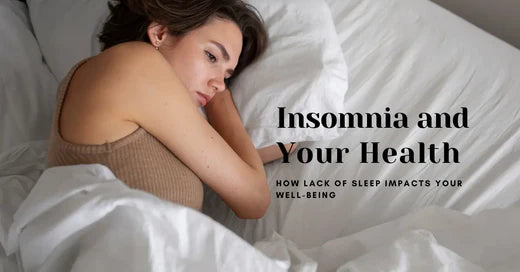
Insomnia and Your Health: How Lack of Sleep Impacts Your Well-Being
Share
Insomnia. Just the word itself can evoke a sense of dread for those who struggle with it. It's the persistent inability to fall asleep or stay asleep, leaving you exhausted and yearning for a good night's rest. But insomnia is more than just a passing annoyance. It can significantly impact your daily life, affecting your mood, concentration, and overall health.
This blog delves into the world of insomnia, exploring its symptoms, causes, and various treatment options. By understanding insomnia, you can take back control of your sleep and wake up feeling refreshed and ready to tackle the day.
Table of Contents
- What is insomnia?
- Symptoms of Insomnia
- The Many Faces of Insomnia: Exploring Causes
- Understanding the Different Types of Insomnia
- Living with Insomnia: The Impact
- Conquering Insomnia Through Lifestyle Changes
- Takeaway
- Frequently Asked Questions
- 1. How much sleep do I need?
- 2. Is it okay to nap if I have insomnia?
- 3. What about melatonin? Can it help me sleep?
- 4. I wake up feeling tired, even after a full night's sleep. What could be wrong?
- 5. Are there any relaxation techniques that can help with insomnia?
- 6. I have a lot on my mind, and it keeps me awake at night. What can I do?
What is insomnia?
Insomnia is a sleep disorder characterized by difficulty falling asleep, staying asleep, or both. It can be a short-term issue triggered by stress or a chronic condition that persists for months or even years.
Here's what differentiates insomnia from occasional sleep problems:
- Frequency and Duration: Insomnia is diagnosed when sleep problems occur at least three nights a week for a minimum of three months.
- Daytime Impact: The key factor is how your sleep difficulties affect your daytime functioning. Do you experience fatigue, difficulty concentrating, or irritability due to sleep deprivation?
Symptoms of Insomnia
The primary symptoms of insomnia include:
- Difficulty falling asleep at night
- Waking up frequently during the night and having trouble falling back asleep
- Waking up too early in the morning and feeling unable to fall back asleep
- Daytime fatigue or sleepiness
- Difficulty concentrating, focusing, or remembering things
- Irritability, anxiety, or depression
- Difficulty participating in social activities or maintaining relationships
- Increased errors or accidents at work due to sleepiness

The Many Faces of Insomnia: Exploring Causes
Insomnia can arise from various factors, broadly categorized as primary insomnia (no underlying medical condition) and secondary insomnia (caused by another medical condition).
Primary Insomnia:
-
Stress and Anxiety: Worries about work, finances, relationships, or health can keep your mind racing at night, making it difficult to switch off and fall asleep.
-
Poor Sleep Habits: Inconsistent sleep schedules, napping during the day, and engaging in stimulating activities before bed (watching TV, using electronic devices) can disrupt your body's natural sleep-wake cycle.
-
Uncomfortable Sleep Environment: An environment that's too hot, cold, noisy, or brightly lit can interfere with sleep quality.
-
Behavioural Issues: Going to bed hungry, consuming caffeine or alcohol close to bedtime, or using the bed for activities other than sleep can all contribute to insomnia.
Secondary Insomnia:
- Medical Conditions: Painful conditions like arthritis, chronic back pain, or heartburn can disrupt sleep. Neurological disorders like Parkinson's disease or restless legs syndrome can also affect sleep patterns.
- Mental Health Conditions: Anxiety, depression, and post-traumatic stress disorder (PTSD) can significantly impact sleep.
- Medications: Certain medications, including antidepressants, stimulants, and some blood pressure medications, can disrupt sleep as a side effect.
- Substance Abuse: Alcohol and drug use can initially make you feel sleepy but disrupt sleep quality throughout the night, leading to insomnia as the effects wear off.
- Sleep Apnea: This sleep disorder causes breathing to stop and start repeatedly during sleep, leading to fragmented sleep and daytime sleepiness.

Understanding the Different Types of Insomnia
Insomnia can be categorized into different types based on its cause and duration:
- Primary insomnia: This is the most common type, where insomnia is the main problem and not a symptom of another underlying medical condition.
- Secondary insomnia: This type arises due to another medical condition, medication use, or a substance abuse problem.
- Acute insomnia: This is a short-term problem, often triggered by stress, life events, or travel. It usually resolves within a few days or weeks.
- Chronic insomnia: This is a long-term issue where sleep problems persist for three months or more, significantly impacting daily life.
- Psychophysiological insomnia: This type is characterized by anxiety about sleep itself. The more you worry about falling asleep, the harder it becomes.
Living with Insomnia: The Impact
Chronic insomnia can have a cascading effect on your well-being. Here's how it can impact your life:
- Reduced Work Performance: Sleep deprivation can lead to difficulty concentrating, decreased productivity, and increased errors at work.
- Strained Relationships: Irritability and fatigue caused by insomnia can affect your relationships with family and friends.
- Mental Health Issues: Insomnia can worsen symptoms of anxiety and depression, and vice versa, creating a vicious cycle.
- Physical Health Concerns: Chronic sleep deprivation weakens your immune system and increases your risk of developing health problems like high blood pressure, heart disease, and diabetes.

Conquering Insomnia Through Lifestyle Changes
Before diving into medicines, it’s better to treat insomnia through lifestyle changes by calming your body and mind.
- Develop a relaxing bedtime routine: Signal to your body that it's time to wind down with a calming pre-sleep ritual. This could include taking a warm bath, reading a book, practising gentle stretches, or listening to calming music. Avoid stimulating activities like watching TV or working on your computer.
- Befriend relaxation techniques: Techniques like deep breathing exercises, progressive muscle relaxation, and mindfulness meditation can be powerful tools to quiet a racing mind and promote sleep. There are many free guided meditations available online or in apps.
- Power down on naps: Naps can be wonderful, but long naps or napping too late in the day can disrupt your nighttime sleep. If you must nap, keep it short (20-30 minutes) and avoid napping after 3 pm.
- Diet for sleep: What you eat and drink can significantly impact your sleep. Avoid heavy meals close to bedtime, and opt for lighter, sleep-promoting foods like fruits, vegetables, and whole grains earlier in the evening.
- Limit stimulants: Caffeine is a notorious sleep disrupter. Avoid caffeinated beverages like coffee, soda, and energy drinks, especially in the afternoon and evening. Alcohol might make you drowsy initially, but it disrupts sleep later in the night. Limit alcohol consumption, especially close to bedtime.
- Exercise – but wisely: Regular physical activity can improve sleep quality. However, avoid strenuous workouts too close to bedtime, as they can be stimulating. Aim for moderate exercise earlier in the day.
Takeaway
Insomnia can feel like an insurmountable obstacle, stealing precious sleep and leaving you drained. But remember, you're not alone in this struggle. Millions of people grapple with insomnia, but there is hope. By understanding the causes and implementing effective strategies, you can significantly improve your sleep quality and wake up feeling refreshed and ready to tackle the day.
Frequently Asked Questions
1. How much sleep do I need?
Adults typically require 7-8 hours of sleep per night, but individual needs can vary. Pay attention to how you feel during the day. If you're constantly fatigued and struggling to function, you might need more sleep.
2. Is it okay to nap if I have insomnia?
Short power naps (20–30 minutes) can be beneficial, but long naps or napping too late in the day can disrupt nighttime sleep. Aim to avoid napping altogether if you're struggling with insomnia.
3. What about melatonin? Can it help me sleep?
Melatonin is a hormone naturally produced by the body that regulates sleep-wake cycles. While melatonin supplements are readily available, their effectiveness for insomnia can vary. It's advisable to consult a doctor before using melatonin, especially if you're taking other medications.
4. I wake up feeling tired, even after a full night's sleep. What could be wrong?
There are several reasons you might feel tired despite getting enough sleep. It could be a sign of an underlying medical condition like sleep apnea or restless legs syndrome. Talk to your doctor to rule out any medical causes.
5. Are there any relaxation techniques that can help with insomnia?
Several relaxation techniques can promote sleep. Consider deep breathing exercises, progressive muscle relaxation, mindfulness meditation, or gentle yoga before bed.
6. I have a lot on my mind, and it keeps me awake at night. What can I do?
Write down your worries before bed. This can help clear your mind and allow you to focus on sleep. Techniques like journaling or to-do lists can be helpful.
